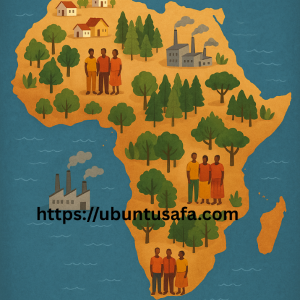Africans leaders, adults, youths and governments needs tap into the forefathers way of life using Ubuntu.

Tapping into the forefathers' way of life through Ubuntu can help African youths, adults, and governments build stronger, more compassionate, and sustainable societies. Ubuntu isn’t just a nostalgic tradition—it offers practical solutions to modern African challenges, from leadership to community development.
Here’s how each group can apply Ubuntu in real, transformative ways:
FOR AFRICAN YOUTHS:
1. Practice Collective Growth
Join or start youth cooperatives, study groups, or community projects.
Share skills, ideas, and support systems: "Your win is my win."
2. Embrace African Identity & Values
Learn indigenous languages, proverbs, and oral traditions.
Challenge negative stereotypes and be proud of communal roots.
3. Digital Ubuntu
Use social media and technology to connect, not divide.
Support each other’s businesses, campaigns, or causes online.
4. Volunteer & Mentor
Help raise the next generation—teach, guide, and support kids or peers.
Be present in your community, not just virtually.
FOR ADULTS:
1. Rebuild the Village Spirit
Reconnect with neighbors. Create safe spaces for dialogue, help, and collaboration.
Support local initiatives—cleanups, savings groups, farm projects, etc.
2. Ubuntu at Work
Promote teamwork, fairness, and mentorship in the workplace.
Create inclusive work cultures where everyone’s voice matters.
3. Teach the Children
Pass on stories, values, and rituals that teach empathy and unity.
Use Ubuntu principles to raise children with character and community focus.
4. Conflict Resolution
Promote forgiveness, understanding, and dialogue instead of revenge or silence.
Use traditional justice models (like elders’ councils) blended with modern law.
FOR GOVERNMENTS & LEADERS:
1. Ubuntu Governance
Adopt people-centered policies—"Leadership as service, not power."
Consult communities regularly; listen to citizens like elders once did.
2. Rebuild Communal Economies
Support local cooperatives, small businesses, and resource-sharing networks.
Encourage local food production, crafts, and value chains.
3. Education Rooted in Ubuntu
Teach Ubuntu values in schools—storytelling, community service, ethics.
Develop leadership programs that train youth in responsibility, humility, and compassion.
4. National Healing & Unity
Use Ubuntu in peacebuilding: post-conflict healing, interethnic dialogue, and reconciliation.
Celebrate national days that promote unity over tribalism or political divisions.
CALL TO ACTION:
"Let Ubuntu be the software that runs the African system—not corruption, not greed, not division."
Ubuntu reminds us that the future is communal, not just individual. If each group—youth, adults, and leaders—lives with Ubuntu at heart, Africa can rise with dignity, unity, and power.
- Questions and Answers
- Opinion
- Motivational and Inspiring Story
- Technology
- Live and Let live
- Focus
- Geopolitics
- Military-Arms/Equipment
- Segurança
- Economy
- Beasts of Nations
- Machine Tools-The “Mother Industry”
- Art
- Causes
- Crafts
- Dance
- Drinks
- Film/Movie
- Fitness
- Food
- Jogos
- Gardening
- Health
- Início
- Literature
- Music
- Networking
- Outro
- Party
- Religion
- Shopping
- Sports
- Theater
- Health and Wellness
- News
- Culture

